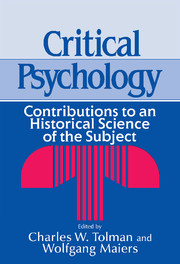Book contents
- Frontmatter
- Contents
- Preface
- Acknowledgments
- Contributors
- Critical Psychology
- 1 Critical Psychology: An Overview
- 2 Critical Psychology: Historical Background and Task
- 3 Societal and Individual Life Processes
- 4 Experience of Self and Scientific Objectivity
- 5 Psychoanalysis and Marxist Psychology
- 6 Emotion, Cognition, and Action Potence
- 7 Action Potence, Education, and Psychotherapy
- 8 Personality: Self-Actualization in Social Vacuums?
- 9 The Concept of Attitude
- 10 Client Interests and Possibilities in Psychotherapy
- 11 Play and Ontogenesis
- 12 Functions of the Private Sphere in Social Movements
- Bibliography
- Index
2 - Critical Psychology: Historical Background and Task
Published online by Cambridge University Press: 21 March 2010
- Frontmatter
- Contents
- Preface
- Acknowledgments
- Contributors
- Critical Psychology
- 1 Critical Psychology: An Overview
- 2 Critical Psychology: Historical Background and Task
- 3 Societal and Individual Life Processes
- 4 Experience of Self and Scientific Objectivity
- 5 Psychoanalysis and Marxist Psychology
- 6 Emotion, Cognition, and Action Potence
- 7 Action Potence, Education, and Psychotherapy
- 8 Personality: Self-Actualization in Social Vacuums?
- 9 The Concept of Attitude
- 10 Client Interests and Possibilities in Psychotherapy
- 11 Play and Ontogenesis
- 12 Functions of the Private Sphere in Social Movements
- Bibliography
- Index
Summary
Critical Psychology is a politically engaged, Marxist, scientific position that is critical of traditional psychology. An introductory sketch of the historical background and program of such a position is made somewhat problematic by the fact that it can be approached and assessed from a number of different scientific and political points of view. I shall simplify matters for myself here by limiting my scope to the “internal scientific” aspects and focusing on just one question: How does Critical Psychology make good the claim that in deriving its concepts and categories, it is being critical both of bourgeois science and of the societal context to which it refers?
I shall have to leave out many details of how Critical Psychology found its origins in the student movement's critique of psychology in the late 1960s, even though an account of these events would aid an understanding of many of our current ideas and pursuits.
A more comprehensive analysis would have to take into account the fact that Critical Psychology has been only one of several attempts to apply the “leftist” critique of science and ideology to an area of knowledge. To avoid confusion, it would be desirable to include a description of the immediate prehistory of Critical Psychology in the initial project of a “critical-emancipatory psychology.” This would show how the demand to overcome the dominant psychology's “science of control” point of view and to do away with the practical and theoretical denial of the subject in an independent development of science and professional practice led to alternative approaches.
- Type
- Chapter
- Information
- Critical PsychologyContributions to an Historical Science of the Subject, pp. 23 - 49Publisher: Cambridge University PressPrint publication year: 1991
- 3
- Cited by



